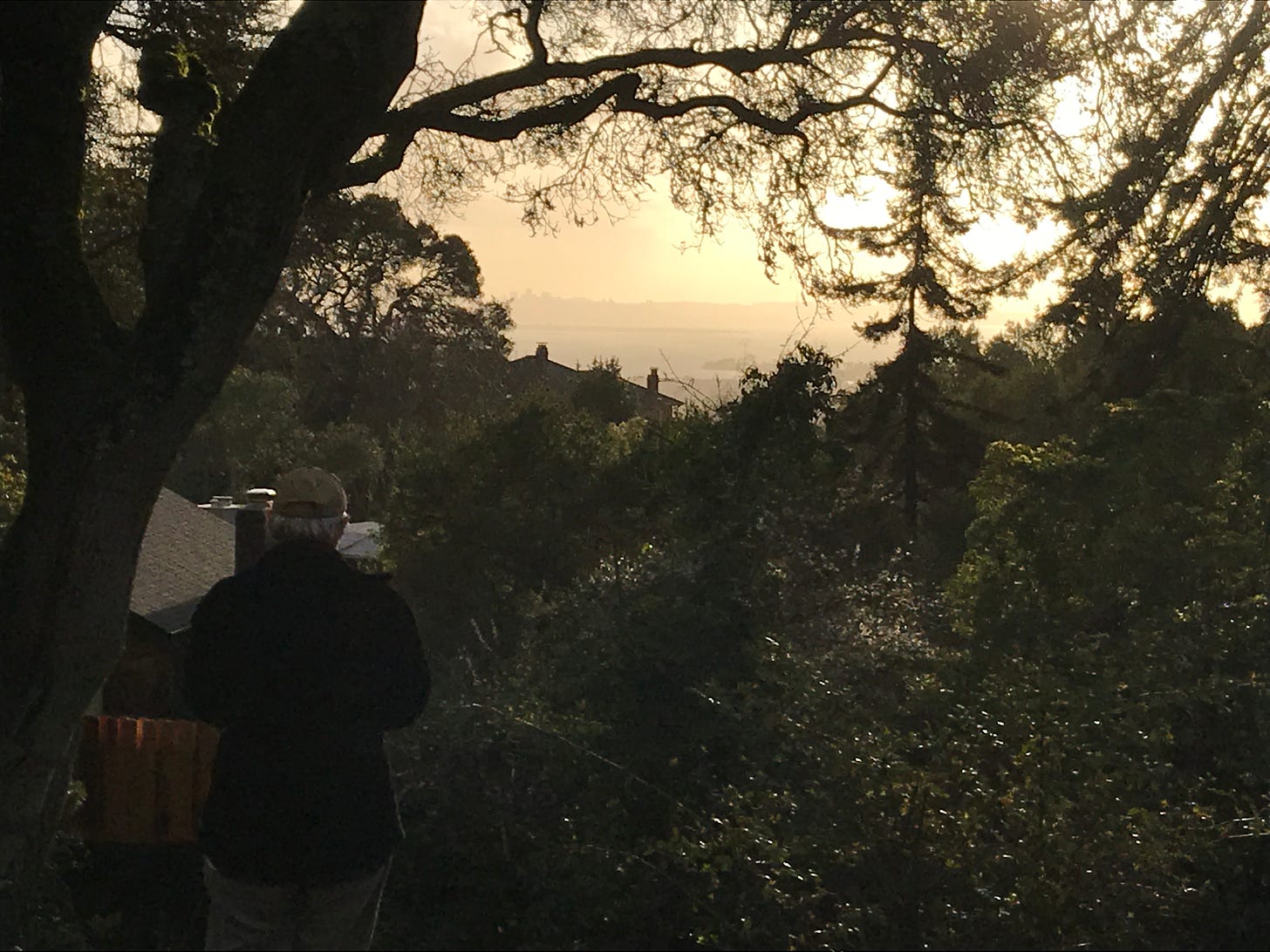I remember believing that climate change was a “soft” issue. It felt like an area of concern that comfortable people, people who weren’t worrying about having a job, feeding their children, dealing with the pressures of race and class, could safely opine about over Thai food. Ironically, the fact that the planetary crisis was all the while sneaking up on everyone, everywhere, made it for a long while undetectable like the background radiation left behind by the Big Bang. It was advancing on all fronts, a stealth enemy rising out of the jungles, the forests, the desert, the rivers, the ocean. It was not a problem the chattering classes could look at and deplore from a safe distance, like the opioid epidemic in rural America. Tsk tsk. Some people got it, but I was not among the prescient, not really paying sustained attention until my granddaughter had to flee the Paradise fire. Then, it was no longer a soft issue.
This is a different perspective for those of us who have grown up in security and abundance. We’re no longer on the outside looking in. I started to have intimations of it six years before the California fire when family members were stranded for weeks without power on Long Island in the aftermath of Hurricane Sandy. It wakes you up. Where your life had previously swung on a pendulum between bursts of “something terrible is about to happen to me or my loved ones because I feel so small and vulnerable” to the more familiar and ongoing “nothing terrible will ever happen to me or anyone I care about” because we are protected by a gardol shield of permanent privilege. At some point, the shield was shredded and the threadbare mesh was infiltrated by fire and flood and hunger and climate migration and species extinction. No matter who you are, if you live in Vancouver, you can’t drive to anywhere in the interior of British Columbia at this writing. See Substack writer Carol Sill’s report from BC at Personal Papers.
I’m not ashamed of the slow pace of my learning to hear the crying of the planet. I understand it as the Gaian way of drawing me in from the periphery of experience, looking through binoculars at something going on “out there,” to truly inhabiting the natural world, recognizing from deep in my gut the legitimacy of my citizenship and belonging. I was a challenge for Spirit, growing up as I did on the fourteenth floor, in the subway, on the sidewalks, in the soot. God had to drag me by my split ends out to the meadow down the road to visit the white butterflies shuttling back and forth a foot off the ground. I had to find my love for them in order to feel embedded. I had to learn to see the miracle in a gray day. It took a while. But that’s the way love works, isn’t it? Nothing in the world, no person, no oak tree, can demand your love. It has to arise of its own accord the way it does for most people when they first see their baby wiggle her toes, where not so long ago there was no baby. Now, there is this living thing that speaks to you. In so many ways at this moment, we need to practice our esperanto, brush up on the secret language we’ve developed for expressing our love for one another and for the songbirds and the worms. As Richard Powers writes in his remarkable and terrifying novel Bewilderment, “if some small but critical mass of people recovered a sense of kinship, economics would become ecology. We’d want different things.”
I’m not ashamed of being a beginner, a neophyte. Every great love affair begins with a furtive glance. I have only just met the world and we’ve only just shared our first kiss. This intimacy won’t grow if I am paralyzed by guilt and fear and a sense of inadequacy. Love thrives in curiosity and there is so much to learn. At seventysomething, I am waking up. Thich Nhat Hahn says that to wake up first of all is to wake up to the beauty of the Earth. I look at my beloved and I see his hazel eyes, the light on the bay in the distance, his soft hands, the champagne yellow of the remaining leaves. But second, to wake up means to wake up to the suffering in the world. I listen to my beloved and I take in the rhythm of his losses, the crackle of her burning, the dirge of his abandonment. I am in it and of it.
Signed copies of my 2019 essay collection Twilight Time: Aging in Amazement are available directly from me. The book can also be ordered from Amazon or your local bookseller.





Beautifully written and powerfully expressed Susie. I too feel so much love and grief for “Mother Nature”. Nature has always been an enormous inspiration for my creative expressions.
Such a graceful resolution to the question, landing in love. Wow. And your title! I loved that you turned around the old mystic quote "In the world but not of it" into something so beautiful and right for us to learn, know and become. (thanks for the link, too.)